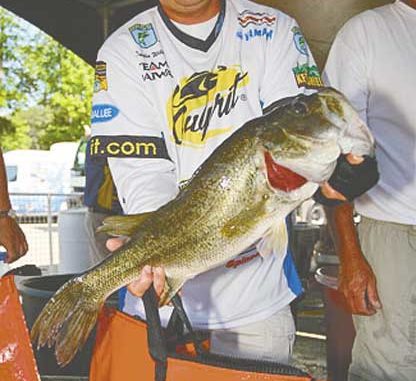
They don’t give prizes for winning practice.
Everyone practices for tournaments differently. The key is to find what works for you and you alone. Don’t listen to anyone else or pay attention to anything on the Internet, unless of course it works for you.
Of course, I’m biased towards the way I do things, which is no advance information, no distractions.
As you can surmise, I like to see things for myself. I guess there’s no right or wrong way to practice, but I’d like to point out a few things I do that may help you get the most out of practicing for a tournament.
In one of my tournament this year, I ran 20 miles at 1 p.m. —during competition — to fish one brush pile I knew had a 5-pound bass.
The reason I knew it held such a fish was I had it bite a topwater popper with my hooks bent down in practice. I got a good look at the fish in practice; it was on an isolated piece of cover.
I thought the cover had a good chance of holding the fish for a long time because there was no other cover in the area. After I ran 20 miles, I made one cast … nothing; two casts … nothing; three casts … nothing. But after the forth cast — bam — I caught that fish.
That put me high in the standings the first day. Had I hooked that fish in practice, it would have been highly unlikely that it would have bit again and I would have been in the bottom half of the standings.
It’s so important in practice, especially with topwater lures, not to catch the fish that bite, so you can catch them when it counts.
My dad pre-fishes with me from time to time and we always fight over that. He wants to catch some fish. He usually gets by with one before I come to take care of his hooks with my pliers.
With any lure, not just topwater, it’s important not to catch too many. Often I’ll try to just pull a bass to the surface with a worm or a jig without hooking it. This way I can gauge the size without harming the area.
But sometimes you have to catch a couple to make sure they’re not too small to be competitive.
If you have a crazy idea, practice time is the time to try it. I usually dedicate at least some time to each day looking for something out of the ordinary.
Fishermen are so good these days they all find the dominant pattern. I prefer to fish unused water and often venture way off the norm to find something I’ll have all to myself.
Try not to get frustrated. Remember you can’t win practice.
Often in practice I end up just eliminating unproductive water and techniques. Many times, my best tournaments have been with my worst practices or least encounters with fish.
Remember conditions will change and keep an eye out for likely spots and areas that will hold fish when conditions do change.
For example if you find fish actively feeding up on a shallow flat, it may be a good idea to find a piece of heavy cover or a drop nearby in case a cold front appears.
Finding options like these in practice saves tons of time during the tournament.
One thing that helps is not showing fish the exact lures you intend to use. That can be through not fishing a specific area and fishing it only during the competition or just using a lure bass with follow but not bite.
For example, if the water is clear, I may practice with an unnatural-looking lure that bass may follow and not bite. Having given away their location, I can go back with a more natural lure and catch them when it counts.
Anyone involved in tournament fishing needs to be prepared. Being prepared is the biggest factor in success.
From prepping tackle, to finding fish and boat maintenance, practice is the time to do it. If you’re struggling at tournaments, take a closer look at your practice time. If you don’t have a chance to practice, make every part of your tackle and boat perfect before competition begins.
Remember, nobody gets a prize for winning practice, but you can win a tournament by knowing how to practice.
Dustin Wilks is a 31-year-old professional bass angler and Raleigh native now living in Rocky Mount. He has qualified for the Bassmaster Classic four times and operates Fish Like a Pro Fishing Lessons (252-883-6749, www.fishlikeapro.com ). His sponsors include Assassinator Spinnerbaits, Chatterbuzz, Skeeter Boats, Yamaha, Daiwa, Keelshield and Culprit.



Be the first to comment